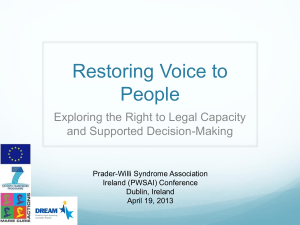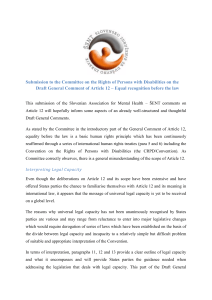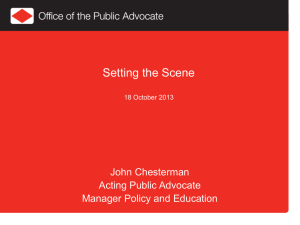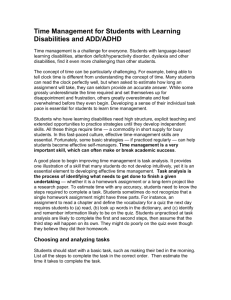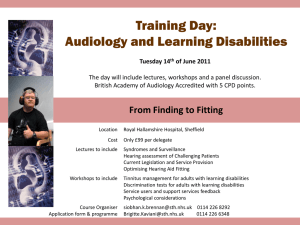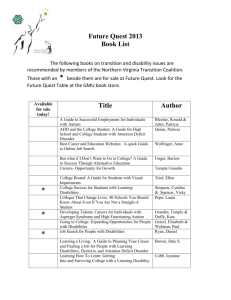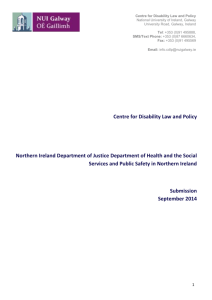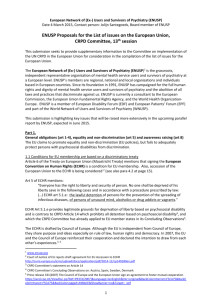12 - Office of the High Commissioner on Human Rights
advertisement
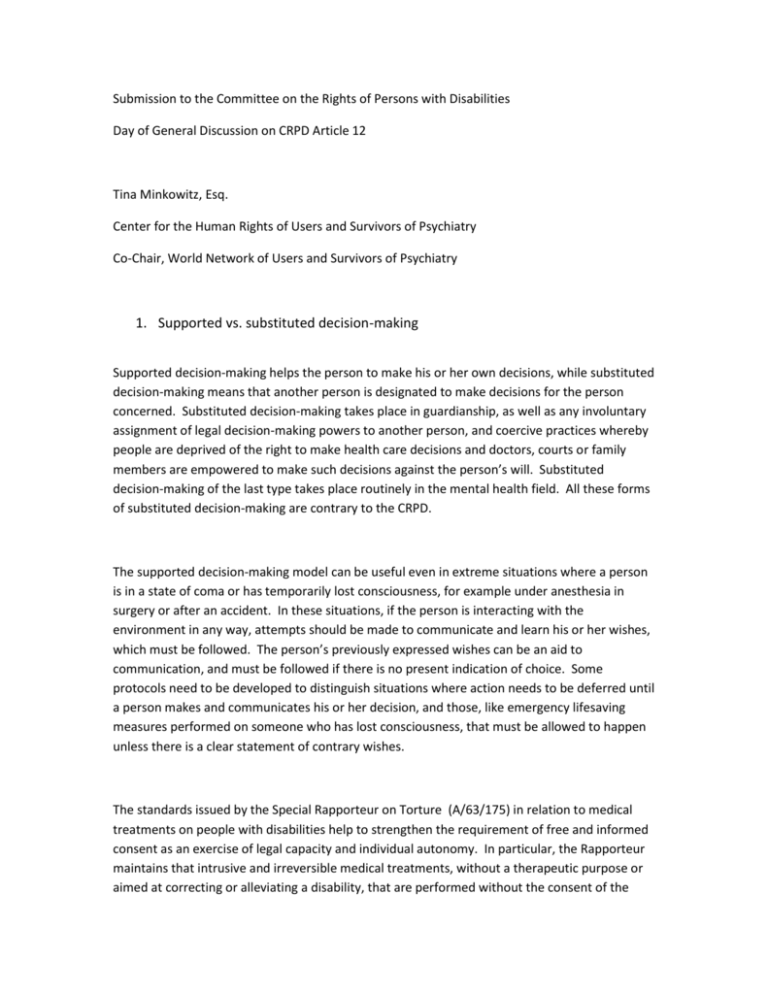
Submission to the Committee on the Rights of Persons with Disabilities Day of General Discussion on CRPD Article 12 Tina Minkowitz, Esq. Center for the Human Rights of Users and Survivors of Psychiatry Co-Chair, World Network of Users and Survivors of Psychiatry 1. Supported vs. substituted decision-making Supported decision-making helps the person to make his or her own decisions, while substituted decision-making means that another person is designated to make decisions for the person concerned. Substituted decision-making takes place in guardianship, as well as any involuntary assignment of legal decision-making powers to another person, and coercive practices whereby people are deprived of the right to make health care decisions and doctors, courts or family members are empowered to make such decisions against the person’s will. Substituted decision-making of the last type takes place routinely in the mental health field. All these forms of substituted decision-making are contrary to the CRPD. The supported decision-making model can be useful even in extreme situations where a person is in a state of coma or has temporarily lost consciousness, for example under anesthesia in surgery or after an accident. In these situations, if the person is interacting with the environment in any way, attempts should be made to communicate and learn his or her wishes, which must be followed. The person’s previously expressed wishes can be an aid to communication, and must be followed if there is no present indication of choice. Some protocols need to be developed to distinguish situations where action needs to be deferred until a person makes and communicates his or her decision, and those, like emergency lifesaving measures performed on someone who has lost consciousness, that must be allowed to happen unless there is a clear statement of contrary wishes. The standards issued by the Special Rapporteur on Torture (A/63/175) in relation to medical treatments on people with disabilities help to strengthen the requirement of free and informed consent as an exercise of legal capacity and individual autonomy. In particular, the Rapporteur maintains that intrusive and irreversible medical treatments, without a therapeutic purpose or aimed at correcting or alleviating a disability, that are performed without the consent of the person concerned, may constitute torture or ill-treatment. Abortion and sterilization, and administration of mind-altering drugs including neuroleptics, electroshock and psychosurgery were given as examples of such treatments. They should never be performed on any person without affirmative, free and informed consent (such as a person who has lost consciousness, a child, or a person who is not indicating a preference in the matter). 2. Contractual capacity Contractual capacity is the same as the capacity to act, which is guaranteed to persons with disabilities on an equal basis with others. Therefore, the existence of a disability cannot be a legitimate basis to determine that a person lacks contractual capacity. Instead, any disability that has an impact on a person’s decision-making needs to be assessed only in order to provide support to exercise legal capacity, and not to prevent the person from performing legal acts. The risk of bad decisions and exploitation of a person’s lack of knowledge, inexperience or recklessness needs to be met by measures such as allowing nullification of legal acts on these grounds, without making the protection specific to people with disabilities. Disability-specific protections feed into paternalistic attitudes towards people with disabilities, and paternalism is a pernicious form of discrimination, based on the belief that someone else knows best how to direct another person’s life. This is contrary to the fundamental principles in CRPD Article 3, and the right to equality before and under the law in Article 5, as well as Article 12. An example of a disability-neutral law protecting against consequences of exploitation is found in Argentina’s Civil Code, Article 954, which says (my translation): Acts vitiated by error, fraud, violence, intimidation or subterfuge may be annulled. The nullity or modification of legal acts may also be demanded when one of the parties exploiting the need, recklessness or inexperience of the other obtained thereby an evidently disproportionate and unjustified financial benefit. 3. Support to exercise legal capacity Support to exercise legal capacity, or supported decision-making, begins with accessible communication, which is also required by CRPD Articles 9 and 21, and communication is defined in Article 2. Attention should be paid to communication needs of people with psychosocial, intellectual and neurological disabilities, as well as those with sensory disabilities. Accessible communication may require sign language interpretation or written material in Braille, tactile communication or assistive devices for hard of hearing people. It may also require plain language materials and explanations for people with intellectual disabilities (which will also likely benefit others), alternative and augmentative communication for those who don’t use ordinary speech or sign language, and an active and patient listening style to converse with people with psychosocial disabilities. Accessible communication can be practiced in every context where legal capacity is exercised, such as in doctor’s offices, lawyer’s offices, courtrooms and banks. Accessible communication services could be provided at the point of need or as an ongoing form of support for those who may use them frequently. For those with more intensive or ongoing support needs, whether intermittently in a crisis situation (especially applicable in the mental health context) or long-term, a support relationship can be developed. Such a relationship should be accountable only to the person receiving support, and not to authorities or third parties. In a support relationship, it is possible to arrange for whatever kind of support a person may need in making decisions. A support network (more than one individual providing support) can be helpful especially when support needs are high, when there is a risk of misinterpreting communication, or simply to have backup in case a primary support person is unavailable or conflicts emerge in the relationship. Such support can be formalized to a greater or lesser degree, depending on the perceived need for accountability of supporters for their role in helping the person to make decisions. This is in keeping with the last sentence of paragraph 4, that safeguards can vary depending on the degree to which a person’s rights and interests are affected. Safeguards need to be understood as including any legal formalities that might be desired for a particular support arrangement. Support can be conceived as a service provided by paid workers, similar to personal assistance services (including family or friends paid to provide support), or as an unpaid arrangement. The merits of both options should be explored. If supporters are paid, it is important to ensure that they do not exercise undue influence to maintain this source of income, and that the person receiving support has easy access to a complaint mechanism and to information about alternative support that may be available, in case of any disputes. Two models for supported decision-making by people with psychosocial disabilities can serve as examples of good practice: PO-Skåne, and Intentional Peer Support. The PO (personal ombudsperson) program reaches out to people without any bureaucratic formalities or involvement of authorities, so they can feel comfortable asking for what they need, and the PO may only act on the person’s direction and not against his or her will. Intentional Peer Support focuses on mutual exploration of concerns, rather than trying to “fix” another person’s problems, and it is designed as “peer” support, that is to be used by people with psychosocial disabilities as each other’s peers and is non-hierarchical, unlike conventional mental health services. In addition, traditional and faith healing offers a social and cultural context for support to move through emotional distress that may be more attuned with a person’s understanding of their situation than conventional services, and allow a wider range of self-expression and healing interactions. 4. Support and alternatives to mental health coercion Creating and maintaining good-quality services that respect legal capacity and autonomy in both form and substance is crucial to implementation of Article 12. Mental health services must be provided to persons with disabilities on the basis of free and informed consent of the person concerned. Free and informed decision-making in health care is an exercise of legal capacity and is also guaranteed in CRPD Article 25; compulsory treatment may also violate the universal norm prohibiting torture and ill treatment that is reaffirmed in Article 15, with additional protections against all forms of exploitation, violence and abuse, and violations of physical and mental integrity, in Articles 16 and 17 respectively. In addition, Article 14 prohibits deprivation of liberty on grounds linked in legislation to an apparent or identified mental illness. (See OHCHR Thematic Study, A/HRC/10/48, paragraph 49). Alternatives to compulsory mental health services have to address two needs: non-violent and non-discriminatory resolution of conflicts in families and communities, and supporting people with psychosocial disabilities in their pursuit of healing and life goals, also providing practical support meeting everyday needs when necessary. Such alternatives start from a premise that people with disabilities have the right to make mistakes, and also have responsibilities as members of society, which may need to be modified as a reasonable accommodation, but cannot be avoided altogether. In addition to the examples of PO-Skåne, Intentional Peer Support, and traditional and faith healing mentioned above, alternatives such as the Soteria model and Open Dialogues, and the Hearing Voices movement, have much to offer, as well as initiatives to eliminate seclusion, restraint and coercion in public mental health systems, and programs to train law enforcement personnel in de-escalating disputes. 5. Safeguards Safeguards to prevent abuse of support can take many forms. Formalizing support relationships, such as by keeping a registry of parties to a support network and logging the legal transactions in which they participated, and the nature of support provided, is one type of safeguard. Availability of remedies against abuse or exploitation in the support relationship is another. It is important that such remedies be easily accessible to persons with disabilities, so that a person receiving support can take the initiative to end the support relationship or complain about abuse if it becomes an issue. (Accessible communication, and accommodations required under Article 13 for access to justice, need to be taken into account when establishing such remedies.) Standards governing the conduct of supporters, including the obligation to respect the rights, will and preferences of the person, and to refrain from conflict of interest and undue influence, should be established and made known to providers of support and people receiving support. Civil and criminal penalties could be considered for failure to comply with standards, particularly for egregious noncompliance amounting to abuse or exploitation. However, weighing against a profusion of safeguards is the need to keep support and avoid bureaucracy, so as to make all aspects of the process easily accessible. Safeguards can also be built in to particular support arrangements. For example, having a support network rather than only one provider of support can safeguard against the risk of abuse (or unintentional misinterpretation) by any one member. Another type of safeguard is aimed at ensuring that support is adequate, to comply with the requirement in paragraph 4 that measures be proportional and tailored to the person’s needs. In some relationships this might best be done by ongoing or regular feedback within the support relationship itself (such as, making a time each year to evaluate how the support is working, or debriefing together after a crisis in which support was used, or similarly debriefing after any important legal act in which support was used). In other relationships it might be done as a level of administrative review where an agency is providing support workers, or by an oversight body with knowledge of how supported decision-making works, which should include significant representation of people with disabilities who use support or who may need support. While a judicial body is an option under paragraph 4, it is difficult to see the need for regular judicial oversight of support, but judicial remedies should be available in cases of alleged exploitation, abuse or coercion. In some situations it may be desirable for safeguards to operate automatically without any need for initiative on the part of the person receiving support, however this should not be mandatory if the person receiving support prefers otherwise. In addition, it will be important to make sure that any such safeguards focus on compliance with standards and obligations (respect for the rights, will and preferences of the person, avoiding conflict of interest and undue influence, adequacy of support) and do not second-guess the choices made by the person receiving support. 6. Criminal responsibility As mentioned in the OHCHR Thematic Study (paragraph 47), defenses based on the negation of responsibility because of the existence of a disability should be replaced by disability-neutral doctrines on the subjective element of the crime, also taking into consideration the situation of the individual defendant. The interests of defendants with disabilities need to be upheld in any such reforms, while using the opportunity to enact any reforms of law enforcement and penal systems needed to respect and fulfill human rights.
